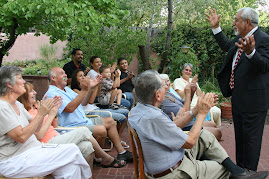Friday, October 31, 2008
Monday, October 27, 2008
EARLY Program Helps Youth with Mental Illness
from the Albuquerque Journal;
Wednesday, October 22, 2008
Program Helps Identify Mental Illness
By Olivier Uyttebrouck
Journal Staff Writer
Dead people were a part of Douglas Fraser's life from the time he was 8 until he was nearly 40. "Frankly, I was living with dead people, either their bodies or part of their bodies, for many years," said Fraser, 51. The hallucinations were terrifying at first but eventually became familiar and somewhat normal.
"They were just people who hung out in my life that weren't actually there," said Fraser, who has been diagnosed as bipolar with psychotic features. "The one that stayed with me the longest was the lower half of a man. He wore black pants, and he was with me a lot."
Fraser says he still experiences some delusions but has largely overcome his illness and has built a good life. He also works with a new University of New Mexico program, offering hope to young people and families battling with mental illness.
The program, called Early Assessment and Resource Linkage for Youth, or EARLY, is intended to identify young people who show early symptoms of mental illness. It targets people ages 12 to 25, said Steve Adelsheim, a UNM psychiatrist who heads the program.
Psychosis can develop at any age, but symptoms most often show up early. Prompt and aggressive treatment can lead to a full recovery, but most people simply don't get help, Adelsheim said.
"One in five children or adolescents develop a mental health issue at some point in time," Adelsheim said. Symptoms of serious mental illness targeted by the program, such as schizophrenia and bipolar disorder, typically begin in adolescence, Adelsheim said.
EARLY aims to give young people and families intensive support that too often is unavailable. "We all feel like it has great potential to support a lot of families in this community," he said.
The center's services are free for those who qualify, although families would pay for drugs or lab work, if required.
Staff perform an initial screening by telephone. Likely candidates then are invited to UNMH for a more thorough evaluation.
The $350,000-a-year program, which opened to patients this month, is funded jointly by the Robert Wood Johnson Foundation and New Mexico philanthropist Suzanne Poole. Those enrolled can choose to receive brain imaging and genetics testing at the Mind Research Network, which is a partner in the program. Ken Kiehl, a UNM psychology professor and Mind researcher, said tools such as magnetic resonance imaging can assist diagnosis and rule out physical illnesses
such as tumors or multiple sclerosis that could cause troubling symptoms.
Key elements of the program are peer mentoring, coaching and multifamily group counseling, Fraser said.
"I've been really, really sick and not much in contact with good old planet
Earth," he said. "The fact that I can be where I am today shows that a lot of
things are possible."
Wednesday, October 22, 2008
Program Helps Identify Mental Illness
By Olivier Uyttebrouck
Journal Staff Writer
Dead people were a part of Douglas Fraser's life from the time he was 8 until he was nearly 40. "Frankly, I was living with dead people, either their bodies or part of their bodies, for many years," said Fraser, 51. The hallucinations were terrifying at first but eventually became familiar and somewhat normal.
"They were just people who hung out in my life that weren't actually there," said Fraser, who has been diagnosed as bipolar with psychotic features. "The one that stayed with me the longest was the lower half of a man. He wore black pants, and he was with me a lot."
Fraser says he still experiences some delusions but has largely overcome his illness and has built a good life. He also works with a new University of New Mexico program, offering hope to young people and families battling with mental illness.
The program, called Early Assessment and Resource Linkage for Youth, or EARLY, is intended to identify young people who show early symptoms of mental illness. It targets people ages 12 to 25, said Steve Adelsheim, a UNM psychiatrist who heads the program.
Psychosis can develop at any age, but symptoms most often show up early. Prompt and aggressive treatment can lead to a full recovery, but most people simply don't get help, Adelsheim said.
"One in five children or adolescents develop a mental health issue at some point in time," Adelsheim said. Symptoms of serious mental illness targeted by the program, such as schizophrenia and bipolar disorder, typically begin in adolescence, Adelsheim said.
EARLY aims to give young people and families intensive support that too often is unavailable. "We all feel like it has great potential to support a lot of families in this community," he said.
The center's services are free for those who qualify, although families would pay for drugs or lab work, if required.
Staff perform an initial screening by telephone. Likely candidates then are invited to UNMH for a more thorough evaluation.
The $350,000-a-year program, which opened to patients this month, is funded jointly by the Robert Wood Johnson Foundation and New Mexico philanthropist Suzanne Poole. Those enrolled can choose to receive brain imaging and genetics testing at the Mind Research Network, which is a partner in the program. Ken Kiehl, a UNM psychology professor and Mind researcher, said tools such as magnetic resonance imaging can assist diagnosis and rule out physical illnesses
such as tumors or multiple sclerosis that could cause troubling symptoms.
Key elements of the program are peer mentoring, coaching and multifamily group counseling, Fraser said.
"I've been really, really sick and not much in contact with good old planet
Earth," he said. "The fact that I can be where I am today shows that a lot of
things are possible."
Subscribe to:
Comments (Atom)

